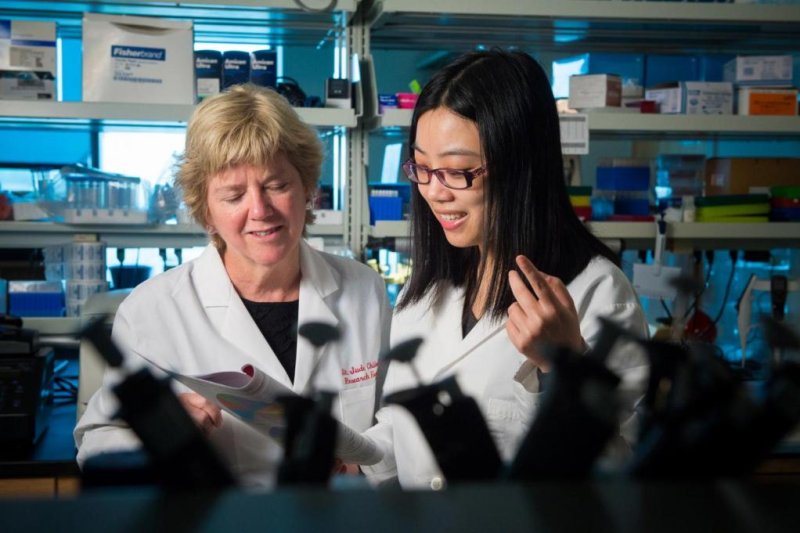Dr. Mary Relling, left, and Dr. Chengcheng Liu review data on patients while searching for genetic variations that may be used to predict pancreatitis in patients being treated with the chemotherapy asparaginase for acute lymphoblastic leukemia. Photo by Peter Barta/St. Jude Children's Research Hospital
MEMPHIS, April 26 (UPI) -- Longer duration or higher doses of chemotherapy during treatment for acute lymphoblastic leukemia increases the risk for pancreatitis, but researchers have identified genetic variants making the side effect much more likely, they report in a recent study.
Researchers at St. Jude's Children's Hospital found the genetic variants increased the risk for pancreatitis when treated with asparaginase, a drug known to significantly reduce the chance for cancer relapse, suggesting some patients require altered treatment regimens.
Acute lymphoblastic leukemia, or ALL, is the most common form of childhood cancer, with asparaginase one of the main drugs used to treat it, although the treatment is also a major cause of pancreatitis. Between 2 and 18 percent of patients develop the painful, life-threatening condition.
In the study, researchers found older patients and those of Native American ancestry are at a higher risk for the side effect but they can tolerate asparaginase for some beneficial period of time before pancreatitis becomes an issue.
Patients in the study with a variation to the CPA2 gene, however, developed pancreatitis within weeks of their first asparaginase treatment, suggesting other drugs should be considered for them.
"That suggests patients with this rare variant cannot tolerate the drug long enough to benefit from treatment," Dr. Mary Relling, chair of the Department of Pharmaceutical Sciences at St. Jude, said in a press release. "For these patients, ALL treatment regimens that do not depend on asparaginase may be preferable."
For the study, published in the Journal of Clinical Oncology, researchers studied the medical records of 5,185 children and young adult patients with ALL. Of these, 117, or 2.3 percent, were diagnosed with pancreatitis at least once during cancer treatment.
After performing a genome-wide association study on the patients, the researchers compared them to a control group of 213 patients without pancreatitis to identify genetic risk factors. They found older age, higher doses of the drug and Native American ancestry all increased the risk for pancreatitis.
Although no there were no common genetic variants to link these patients, a rare variance to CPA2 that produces a mutated version of pancreatic enzyme proCPA2 was found in two patients -- both of whom developed pancreatitis within weeks of their first asparaginase treatment.
"In this study we identified several independent risk factors for asparaginase-induced pancreatitis and also gained insight into the mechanism responsible for this serious treatment complication," Relling said. "Understanding the risk factors for acute pancreatitis is important because in patients who can tolerate the drug, asparaginase reduces the likelihood that ALL patients will relapse."















